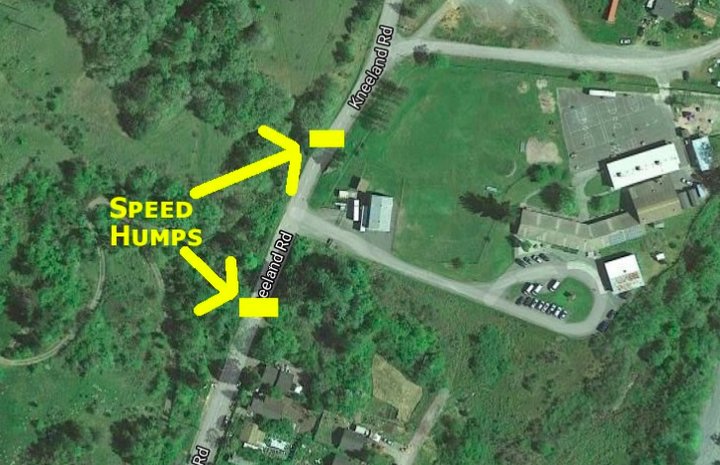
Screenshots from Tuesday’s meeting (clockwise from top left): First District Supervisor Rex Bohn, Second District Supervisor Michelle Bushnell, Third District Supervisor Mike Wilson, Fourth District Supervisor Virginia Bass, Sheriff Billy Honsal and Fifth District Supervisor Steve Madrone.
###
As calls for criminal justice reform continue nationwide in the wake of the murder of George Floyd by a Minneapolis police officer, the Humboldt County Board of Supervisors spent much of Tuesday’s meeting debating a California bill that would lift restrictions on who can run for sheriff.
The proposed law, Senate Bill 271, would open the position to all registered voters, repealing restrictions enacted in 1988. Proponents, including Sen. Scott Wiener of San Francisco, argue that it would improve accountability and boost diversity. Wiener has criticized a few specific sheriffs for cooperating with immigration authorities, refusing to enforce COVID-19 public health orders and/or operating jails that are “not exactly up to snuff in terms of protecting human rights, access to health care and helping people to actually stay alive while they are in jail.”
Meanwhile, law enforcement groups, including the California Police Chiefs Association and California State Sheriffs’ Association, have come out strongly against the bill, arguing that Police Officer Standards and Training (POST) certification serves an important public safety function and that opening eligibility to virtually anyone would “overly or overtly politicize this office.”
First District Supervisor Rex Bohn and Second District Supervisor Michelle Bushnell brought forward a letter of opposition to the bill Tuesday, asking their fellow board members to authorize the chair to sign it and send it off to Sacramento. After a lengthy debate and some minor wordsmithing, the board approved the letter via a 3-1 vote, with one abstention.
“To me, this one just doesn’t make a lot of sense unless you’re trying to tip the scales politically,” Bohn said. He argued that sheriffs in rural counties like Humboldt are “working sheriffs” rather than mere managers or executives and they should know the law because they often have to step in and actually enforce it.
Bushnell agreed, saying it’s important for sheriffs to be in touch with their deputies and know what they’re up against. “I have a lot of concerns about this bill,” she said.
Humboldt County Sheriff Billy Honsal also voiced his opposition to the bill, and he tied his argument to other efforts at police reform. He noted that there’s a push to raise the age and education requirements for becoming a law enforcement officer. “If we’re thinking about the entry level of law enforcement officers getting higher training … why wouldn’t we require that for the chief executive of the sheriff’s office?” he asked.
Honsal also noted that the law would allow someone who has been decertified in law enforcement to get elected sheriff.
But Fifth District Supervisor Steve Madrone said he’s not worried about Humboldt County voters electing an unqualified candidate, such as an 18-year-old with no training.
“I don’t have a problem with the [proposed] law, personally,” he said. “Variety and competition is a good thing.” Instead, he suggested that there should be more funding for street outreach workers to accompany deputies as a way to facilitate de-escalation in conflicts with those who may be suffering from mental illness.
Third District Supervisor Mike Wilson said his position is “fairly nuanced” and questioned the wisdom of opposing a bill that’s still being workshopped in the legislative process.
“I’m not sure this is ripe yet,” he said. “Negotiations are still happening. I have a hard time even voting on this without knowing where this is gonna go. … If this moves to a vote I’ll probably abstain.”
That left Fourth District Supervisor Virginia Bass as the swing vote, and she seemed to waffle back and forth during the discussion. She initially agreed with Wilson that the pending legislation is “not ripe” and said she was uncomfortable sending a letter stating blanket opposition to the bill. “We could do ‘opposed unless amended,’” she suggested.
The lone public commenter for the item, Karpani Burns (no relation to this reporter), lambasted the board’s proposed opposition as an attempt “to sustain the elite power structure and status quo.”
“To have our elected representatives dig in and resist the inevitable like petulant children having their lollipops taken away is again revealing,” Burns said.
Bass suggested holding off on a letter for now and asking Honsal to return in a few weeks to revisit the topic. Bohn, in turn, suggested writing that the board opposes the bill as currently written. A few other variations of phrasing were tossed around, but both Bohn and Honsal held firm in their conviction that the letter should state opposition.
The board wound up voting on a letter in which the chair, on behalf of the board, writes “to express respectful opposition to the bill as written due to concerns [about] how it affects rural counties.” Bohn, Bushnell and Bass voted in favor, Madrone voted against and Wilson abstained. The motion carried.
###
The board must have been in a debating mood because the next item on the agenda — which was billed by Deputy Director of the Land Use Division Bob Bronkall as a mere “cleanup ordinance” to correct “a scrivener’s error” and remove unnecessary wording from county code — sparked a board discussion about subdivision and housing development.
Both Bohn and Madrone said they’d like to simplify the permitting process and reduce fees on small-scale subdivisions as a means to stimulate housing starts.
Wilson countered that there’s a lot of pressure from real estate interests to develop housing in rural, remote locales rather than existing cities. “We want to be careful about the long-term costs and impacts with relationship to sprawl,” he said.
Planning and Building Director John Ford stepped in to say those matters could be brought back to the board at a later date, but today’s item was just about cleaning up an existing ordinance. The board voted unanimously to approve staff’s recommendation.
###

Image via the County of Humboldt.
Lastly, before adjourning to closed session, the board considered a request from the Bridgeville Community Center to approve a pair of speed humps for Kneeland Road, on either side of the entrance to Bridgeville School.
The community center, a nonprofit, has identified grant funding to build the speed humps, but it needed approval by the board. The little town of Bridgeville, as you may recall, is owned by a private corporation, Bridgeville Properties, LLC, in care of a SoCal resident named Cynthia LaPaille. According to a staff report, she can’t bring the matter to her board of directors for approval until June, which is past the application deadline for the grant.
But the proposed speed humps have support from neighboring property owners, the Humboldt County Sheriff’s Office, the Bridgeville Fire Department and CalFire, and after a brief discussion at today’s meeting, the board unanimously added its own approval to that list.
CLICK TO MANAGE